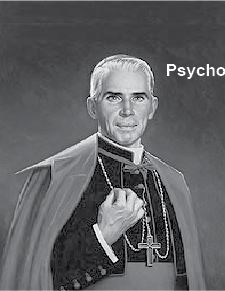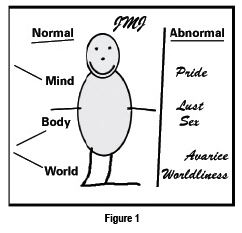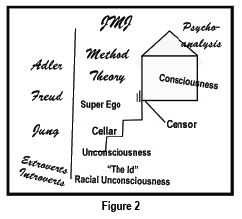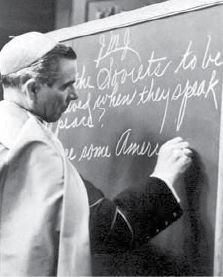 In the next few issues of the MICHAEL Journal, we will take our readers through a comprehensive study of the uses and dangers of psychology and psychiatry. We will study the focus to which this field should be directing itself and how it pertains to man. We will be reviewing the effects of psychotropic drugs, as well as the excesses of pharmaceutical companies in this regard and their link with the Federal Drug Administration.
In the next few issues of the MICHAEL Journal, we will take our readers through a comprehensive study of the uses and dangers of psychology and psychiatry. We will study the focus to which this field should be directing itself and how it pertains to man. We will be reviewing the effects of psychotropic drugs, as well as the excesses of pharmaceutical companies in this regard and their link with the Federal Drug Administration.
This is the first segment in which we would like to present, through the words of Archbishop Fulton Sheen (whose cause is in Rome for beatification), exactly what psychology and psychiatry should be teaching us. Archbishop Sheen presents this study in a clear and descriptive manner, in a way which makes this often misunderstood subject very easy to understand.
Every human being has a vital principle inside of him, which manifests itself in terms of urges, impulses and passions... these have also been called, concupiscence. There are principally three of them:
1) The self-perfection of the human mind. If we never had this drive within us, we would never seek to perfect ourselves intellectually or socially.
2) We have another drive, because man does not only have a mind or a head; he’s got a body. This impulse is directed to the body and its pleasures. Particularly to the self-perpetuation of the human species.
3) In addition to these two urges, we also have an urge for that which is outside of us, namely for the world. For example, we have an urge for the ownership of property; to own things, such as an automobile.
Now these are very normal urges, and a person must not think that there is something wrong with him, simply because he wants to perfect his mind, generate the human species or own property. These things are normal.

Now, it can happen that these urges will not always be controlled by reason or by the love of God. And when these impulses, passions, concupiscence, and urges get the better of us, this natural urge for the self-perfection of the mind can become pride, egotism, or selfishness. The urges of the body for the self-perpetuation of the human species, when not subject to law and right reason, can become what used to be called lust, and today is called sex. (Although not properly.)
The third urge, if it is not controlled by reason, can become avarice, selfishness, or worldliness. These we understand as abnormal or not normal.
Now we come to the science of psychiatry.
In what is psychiatry interested: the normal, or the abnormal? The answer is: the abnormal.
There are three psychiatrists who are most prominent in regards to the development of this science. Alfred Adler developed his theory on pride. Sigmund Freud concentrated on the flesh, carnality, and sex. Carl Jung dealt with security and our relationship to the objective world.
These three men were the pioneers of psychiatry. Before I explain their theories, I would like to make a distinction. The distinctions will be between the method and the theory.
Suppose one were interested in the study of falling bodies. I mean, falling human bodies. One way of investigating the study of falling bodies would be with a camera by taking pictures of human beings who are falling. This would be a method of investigation. Now suppose you began by explaining how the man fell. That’s entirely different, because here you would be studying motive.
Suppose one said, “Well, the reason this particular man jumped from the bridge was because someone called him a coward and he wanted to affirm his superiority.” That would be Adler’s theory. Now suppose another said, “No, the man in question was sexually maladjusted.” That would be Freud. Another one said, “He just wanted to show off; he was an extrovert.” That would be Jung.
Remember that these are only theories! But how do these theories agree or differ? Firstly, they all agree on the method, which is good!
The method is called psychoanalysis. The major credit or development of the method of psychoanalysis must be given to Sigmund Freud. Adler and Jung had at one time associated with him, but they separated because Freud emphasized sex too much.
Psychoanalysis starts with the proposition that, in addition to a conscious mind, we also have an unconscious mind. Imagine the first floor of a house (see fig. 2 at right). These are the stairs that go down and this is the cellar. This is the unconscious mind (writes at bottom of stairs), and the conscious mind (first floor of house) and this is the cellar door. Just as many housewives throw garbage down into the cellar, so the mind does also.
The human mind often throws down the unconsciousness, the ideas that are unpleasant and which the mind seeks to repress. It throws them down into the unconsciousness and it is rare that they ever get upstairs. Why? Because there’s a little man here (draws) called the censor and whenever a thought that’s down here (cellar) starts coming up the stairs this little censor cracks him on the head.
Do these thoughts ever get up into your consciousness? Sometimes they show themselves in dreams, say the psychoanalysts. But then the ideas are disguised, so they do not come up as they really are. You don’t know what they mean, but the psychiatrist does. He knows. And he’ll tell you what they are, just not for nothing (implying large fees). Now on this, they practically all agree. And this method of studying the unconscious mind is valid and right and good and necessary, in many circumstances.
How do you explain the unconscious mind, what is inside it, and its relation to the conscious mind? On this subject there is no agreement from the three schools of Adler, Freud, and Jung.
1) The theory of Adler says that there is, in everyone, a drive for superiority or pride. If this drive for superiority is thwarted for some reason or other, if it is repressed, it is driven down into the unconsciousness and comes up later in a disguised way. Adler calls this an inferiority complex. He says that the basic drive for superiority manifests itself by aggressiveness, boasting, selfishness, and a thousand other forms. In other words, it was Adler who gave us these words that are so often used today: inferiority and superiority complex.
 2) The theory of Freud says that everyone is determined to be what he is, for the most part, during the first 6 years of his existence. During these first six years, a child senses pleasures that are associated with certain organs of the body. In this part of the unconsciousness, and here I quote Freud: “There is the urge to cannibalism, incest and murder.” Every boy (according to Jung) has within himself an urge to kill his own father in order to marry his own mother. This is what is known as an oedipus complex. Every girl has the urge to kill her own mother in order to marry her own father. That is an electra complex. Now each one would like to recover later on in life, these pleasures of the first six years that are down here (cellar) in what Freud calls the “Id”. “Id” is a Latin word for “that.” But up in the consciousness, there is what he calls the ego and the super ego, there are the taboos, morals and conventions of society which repress these infantile urges. The “Id” constitutes human nature. Now there are many Freudians who say therefore the way to release many of these complexes is to allow the “Id” an uninhibited outlet. I say there are some Freudians who teach that. That’s another theory.
2) The theory of Freud says that everyone is determined to be what he is, for the most part, during the first 6 years of his existence. During these first six years, a child senses pleasures that are associated with certain organs of the body. In this part of the unconsciousness, and here I quote Freud: “There is the urge to cannibalism, incest and murder.” Every boy (according to Jung) has within himself an urge to kill his own father in order to marry his own mother. This is what is known as an oedipus complex. Every girl has the urge to kill her own mother in order to marry her own father. That is an electra complex. Now each one would like to recover later on in life, these pleasures of the first six years that are down here (cellar) in what Freud calls the “Id”. “Id” is a Latin word for “that.” But up in the consciousness, there is what he calls the ego and the super ego, there are the taboos, morals and conventions of society which repress these infantile urges. The “Id” constitutes human nature. Now there are many Freudians who say therefore the way to release many of these complexes is to allow the “Id” an uninhibited outlet. I say there are some Freudians who teach that. That’s another theory.
3) The theory of Jung is that, in the unconsciousness, is not only this primary sex impulse of Freud. There is not only the personal but there is also what he calls a racial unconsciousness. That is to say, the collective unconsciousness of the whole human race. There are myths, symbols and so forth, by which man is in a kind of a symbolic relationship with his past. Man is constantly trying to get in contact with the world, if he can. And some manifest this contact with the world quite openly and they become extroverts and others find themselves at great pain in order to contact the world and they remain inside themselves; they are called introverts.
These are the original theories of psychiatry explained as simply as possible. Note that none of them have explained the whole man! Each has taken a third. Incidentally, each is also one third correct. (That man is made of body and mind.) But they have not taken the whole man into account and furthermore, they are only theories!
The Rockerfeller Foundation gave enough money to a professor of Harvard to analyse 116 articles and books. He did clinical studies, which were supposed to explain the Freudian theory alone. The answer given after this long and expensive investigation was that these clinical studies could just as easily be explained by any other theory. Now it is very important to remember that these are theories, even if the method behind the theory is solid and enduring.
Now we come to a study of other developments in psychiatry; it breaks a little bit with the psychoanalytic approach. The first development is the recognition that man is a psycho-somatic unit. Psycho: he has a mind. Somatic: he has a body. The two are related, one to the other.
 It has been proven, according to the research. I was talking to a doctor who is doing research along these particular lines. She is interested in the chemistry of a cell and metabolism. The scientist says that it is possible to notice the chemical changes in a cell where there is great fatigue. When the chemistry of a cell changes, it affects the glands and the brain. Therefore, according to these developments, there is often a physiological basis for psychoses and neuroses. In other words, psychiatry should work against this kind of angelism1 which regards the subconscious mind as something floating around in space. We know that our mind is related to our body; it is related to an organism. Thus, the body has an effect on the mind, and the mind has an effect on the body.
It has been proven, according to the research. I was talking to a doctor who is doing research along these particular lines. She is interested in the chemistry of a cell and metabolism. The scientist says that it is possible to notice the chemical changes in a cell where there is great fatigue. When the chemistry of a cell changes, it affects the glands and the brain. Therefore, according to these developments, there is often a physiological basis for psychoses and neuroses. In other words, psychiatry should work against this kind of angelism1 which regards the subconscious mind as something floating around in space. We know that our mind is related to our body; it is related to an organism. Thus, the body has an effect on the mind, and the mind has an effect on the body.
In many cases, there is a physiological, biological, and metabolical foundation for mental diseases. And this is where the basis is medical; psychological methods will not do. As the late psychiatrist, Bonaventura, stated: “There is something specifically human in man, namely his urge towards morality, that sometimes his unconscious mind can be controlled, sometimes there may be a sense of guilt and a psychiatrist must take account of it.”
Man has reason and the power of choice; he is a responsible being trying to give some significance to life. And the existence and the problem of values have a tremendous effect upon him. It is not enough, for example, merely to analyse where to find the dead acorn from which the oak came; you do not explain the oak by that rotted acorn. When a ship is sinking, it is not nearly enough to analyse the waters that pour into the hold of the vessel. You explain these things also by something else; namely you explain them by the intellect, artistic skill, and resolution.
I would like to plead with our college students of today, that they insist on being given some normal psychology as well as abnormal psychology. Not everyone in this world is cracked! We are reasonable beings and our (college and university) teachers should know that and ought to tell us that not only do we have a body but we also have a soul and reason and the power of choice.
We cannot be told that the freedom of the world is in danger, and then be told the next moment, by an antiquated school of psychoanalysts or psychiatrists, that man has no freedom; that he is determined completely by infantile urges. In other words, if we are to discover the full glory of the science, even with the psychoanalytic method, we would do it by recognizing the truth of what St. Augustine has said, “Our hearts were made for Thee, Oh God, and they are restless, until they rest in Thee!”
(End of Part 1)
Archbishop Fulton Sheen
1.) Angelism is a theory of human existence that minimizes concupiscence, and therefore ignores the need for moral vigilance and prayer to cope with the consequences of original sin. In general, it is the tendency to regard human affairs with casual optimism, as though human beings were angels without bodily needs and without proneness to sin.